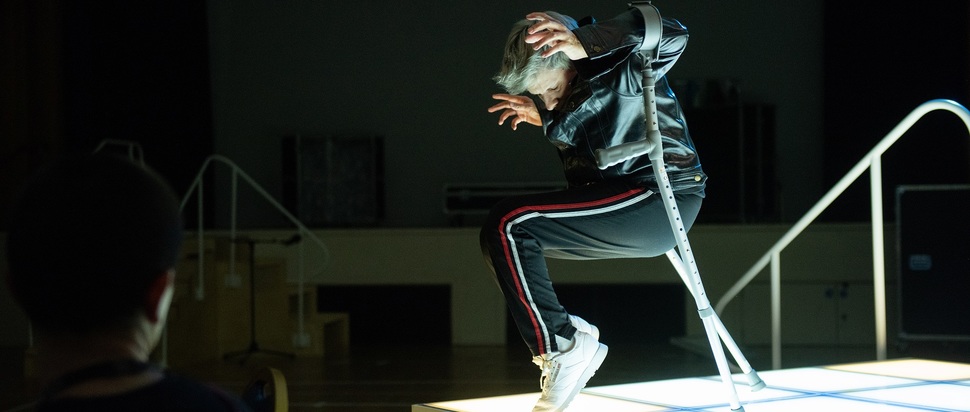Diverse Critics: Bringing new perspectives to arts criticism
Disability Arts Online’s Editor Colin Hambrook and Assistant Editor Joe Turnbull introduce the Diverse Critics programme
Diverse Critics is a new programme delivered in a partnership between The Skinny, Creative Scotland and Disability Arts Online. It will develop the careers of four aspiring arts journalists based in Scotland. Disability Arts Online’s Editor Colin Hambrook and Assistant Editor Joe Turnbull introduce the programme and the need for fresh perspectives across the arts and cultural scene
Readers of this publication are probably well aware that Scotland is a cultural powerhouse. Home to the ‘world’s biggest arts festival’ (Edinburgh Fringe, obviously), not to mention Glasgow International, the new V&A in Dundee… we could go on and on. You may be less versed in the fact it also boasts some of the world’s leading Disability Arts talent.
Historically, Disability Arts has been intertwined with the Disability Rights Movement, which fought for human rights and equality for disabled people, particularly in the 80s and 90s, culminating in the Disability Discrimination Act in 1995. Today it encompasses work across art forms practised by disabled artists, bringing their own unique perspectives and aesthetics to work, often with a social or political aspect. We know it’s a space where some of the most exciting and innovative work is being made.
Flying the flag for Scotland are a slew of artists and companies including learning-disabled theatre company Lung Ha, Deaf theatre company Solar Bear, learning-disability arts organisation Project Ability, Deaf theatre-maker Ramesh Meyyappan and integrated dance company Indepen-dance. Choreographer Claire Cunningham and theatre company Birds of Paradise are two leading proponents of Disability Arts, regularly touring and mentoring internationally. Last year, Cunningham’s Thank You Very Much debuted at Manchester International Festival (before coming to Glasgow, then Germany), while Birds of Paradise played to sell-out crowds with Purposeless Movements at Edinburgh International Festival.
Despite notable achievements and undeniable quality, disabled people remain massively underrepresented across the arts, with Creative Scotland recognising ‘employment of disabled people in [its] funded organisations is low’. Given the fact that disabled people are much more likely to live in poverty (50% of all disabled people do), the increasing ‘class ceiling’ of the arts sector also disproportionately affects them.
This also extends to criticism and arts journalism. A 2019 report from Ofcom found that only 6% of broadcast journalists identify as disabled, compared to 19% of the working-age population. When we leave out the unique perspectives of a section of society, we are all the poorer for it. Since Disability Arts Online became established in 2004, nurturing, supporting and showcasing the artistic expression and critical engagement of disabled people has been at the heart of what we do.
That’s why we’re so excited to be partnering with Creative Scotland and The Skinny to deliver Diverse Critics, a career development programme for four aspiring disabled arts journalists, who will receive a bursary, mentoring, training and publishing opportunities. It is our hope that it will not only enable them to have careers in arts journalism but also help the wider arts sector to diversify the voices that get heard.
“Professional arts criticism is an important element of the creative cycle, connecting work in the sector with audiences and providing artists with informed responses to their work,” says Creative Scotland’s Equalities & Diversity Officer, Graham Reid. “As well as the artists and companies creating and presenting new work, it is vital that those critical voices are representative of the diversity within our society. This pilot project aims to help remove some of the barriers met by emerging disabled writers, but is also about recognising the value of a rich diversity of perspective for readers, audiences and artists.”
The artists themselves are also well aware of the value of criticism. “For a long time art by disabled people suffered because it wasn't subjected to the same level of critique as other work – non-disabled critics felt they lacked the knowledge they needed to discuss the work and didn't want to offend,” explains Artistic Director of Birds of Paradise, Robert Softley Gale. “There's a real value in hearing what 'your people' think of your work. This scheme – in training more disabled arts journalists – will be crucial in moving all of our work forward.”
Cunningham agrees: “It’s always important to hear what people have responded to who are outside of the process and removed from your own circles of friendship, and from those who are seeing a lot of other work. It's essential that we have disabled critics. It matters to me that disabled critics review my work, partly because I see peer critique as incredibly important. However, it's also important that disabled critics are reviewing work by non-disabled artists from a lived experience of disability perspective and, if necessary, calling out the ableism.”
Some of the articles produced as part of the Diverse Critics programme will grace these pages over the coming months. Prepare to be excited, challenged and entertained.
